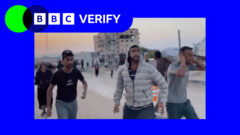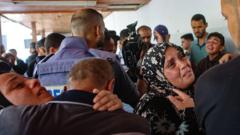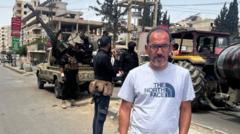**The shooting of Omar Mohammed Saada Rabea has ignited international condemnation and drawn focus on escalating violence in the region following recent clashes.**
**Tragic Death of Palestinian-American Teen Sparks Outrage in West Bank**

**Tragic Death of Palestinian-American Teen Sparks Outrage in West Bank**
**14-Year-Old Boy Killed in Israeli Forces Clash, Heightening Tensions in Ongoing Conflict**
In a tragic incident that underscores the mounting tensions in the West Bank, a Palestinian-American teenager, Omar Mohammed Saada Rabea, aged 14, was shot and killed by Israeli forces near the town of Turmus Ayya, according to Palestinian officials. This incident, which occurred on Sunday evening, also left two other boys, both aged 14, injured; one critically.
The Israeli military asserts that their troops fired upon three individuals they deemed "terrorists" who were allegedly throwing stones at vehicles on a nearby highway, which they claimed posed a danger to drivers. Conversely, the Palestinian foreign ministry characterized this event as another example of “extrajudicial killings” perpetrated by Israeli forces against civilians.
As the situation escalates following Hamas's attack on Israeli territories on October 7, 2023, and the subsequent military response in Gaza, the West Bank has seen a marked increase in violence. Reports indicate hundreds of Palestinians have died due to intensified Israeli counter-terrorism activities, which the military claims aim to prevent deadly attacks from Palestinian groups.
Omar's death occurred approximately 15 km northeast of Ramallah, in an area with a significant Palestinian-American demographic, leading to additional scrutiny and despair among the local community. The Palestinian Red Crescent reported one of the injured boys was shot in the lower abdomen while picking fruit.
Further complicating the narrative, the father of another injured boy stated that his son, also a US citizen, was delayed in receiving medical attention after an ambulance was stopped by Israeli soldiers at a checkpoint. In a defense statement, the Israel Defense Forces (IDF) stated they responded to stone-throwing with gunfire, resulting in the death of Omar and injuries to the other boys.
The Palestinian Authority's foreign ministry has vocally criticized the use of live ammunition against minors, emphasizing that such violent acts by Israel reflect its status as an occupying power and foster a climate of impunity. Recently, the UN human rights chief, Volker Türk, expressed grave concerns over the escalating violence in the West Bank, citing the number of casualties and the destruction wrought by Israeli military operations.
Since the renewal of hostilities, the UN has reported that at least 909 Palestinians, including 191 children, have been killed, raising alarm over potential extrajudicial killings. In stark contrast, Israeli fatalities from Palestinian actions have totaled 51 during this same timeframe, heightening the sense of urgency and concern in both communities.
As international leaders, including Israeli Prime Minister Benjamin Netanyahu and US President Donald Trump, discuss future strategies regarding the ongoing conflict, the loss of young lives and the cries for justice echo more loudly than ever throughout the region. With each incident, the complexities of the Israeli-Palestinian conflict only deepen, raising questions about the road to peace and reconciliation.
The Israeli military asserts that their troops fired upon three individuals they deemed "terrorists" who were allegedly throwing stones at vehicles on a nearby highway, which they claimed posed a danger to drivers. Conversely, the Palestinian foreign ministry characterized this event as another example of “extrajudicial killings” perpetrated by Israeli forces against civilians.
As the situation escalates following Hamas's attack on Israeli territories on October 7, 2023, and the subsequent military response in Gaza, the West Bank has seen a marked increase in violence. Reports indicate hundreds of Palestinians have died due to intensified Israeli counter-terrorism activities, which the military claims aim to prevent deadly attacks from Palestinian groups.
Omar's death occurred approximately 15 km northeast of Ramallah, in an area with a significant Palestinian-American demographic, leading to additional scrutiny and despair among the local community. The Palestinian Red Crescent reported one of the injured boys was shot in the lower abdomen while picking fruit.
Further complicating the narrative, the father of another injured boy stated that his son, also a US citizen, was delayed in receiving medical attention after an ambulance was stopped by Israeli soldiers at a checkpoint. In a defense statement, the Israel Defense Forces (IDF) stated they responded to stone-throwing with gunfire, resulting in the death of Omar and injuries to the other boys.
The Palestinian Authority's foreign ministry has vocally criticized the use of live ammunition against minors, emphasizing that such violent acts by Israel reflect its status as an occupying power and foster a climate of impunity. Recently, the UN human rights chief, Volker Türk, expressed grave concerns over the escalating violence in the West Bank, citing the number of casualties and the destruction wrought by Israeli military operations.
Since the renewal of hostilities, the UN has reported that at least 909 Palestinians, including 191 children, have been killed, raising alarm over potential extrajudicial killings. In stark contrast, Israeli fatalities from Palestinian actions have totaled 51 during this same timeframe, heightening the sense of urgency and concern in both communities.
As international leaders, including Israeli Prime Minister Benjamin Netanyahu and US President Donald Trump, discuss future strategies regarding the ongoing conflict, the loss of young lives and the cries for justice echo more loudly than ever throughout the region. With each incident, the complexities of the Israeli-Palestinian conflict only deepen, raising questions about the road to peace and reconciliation.




















